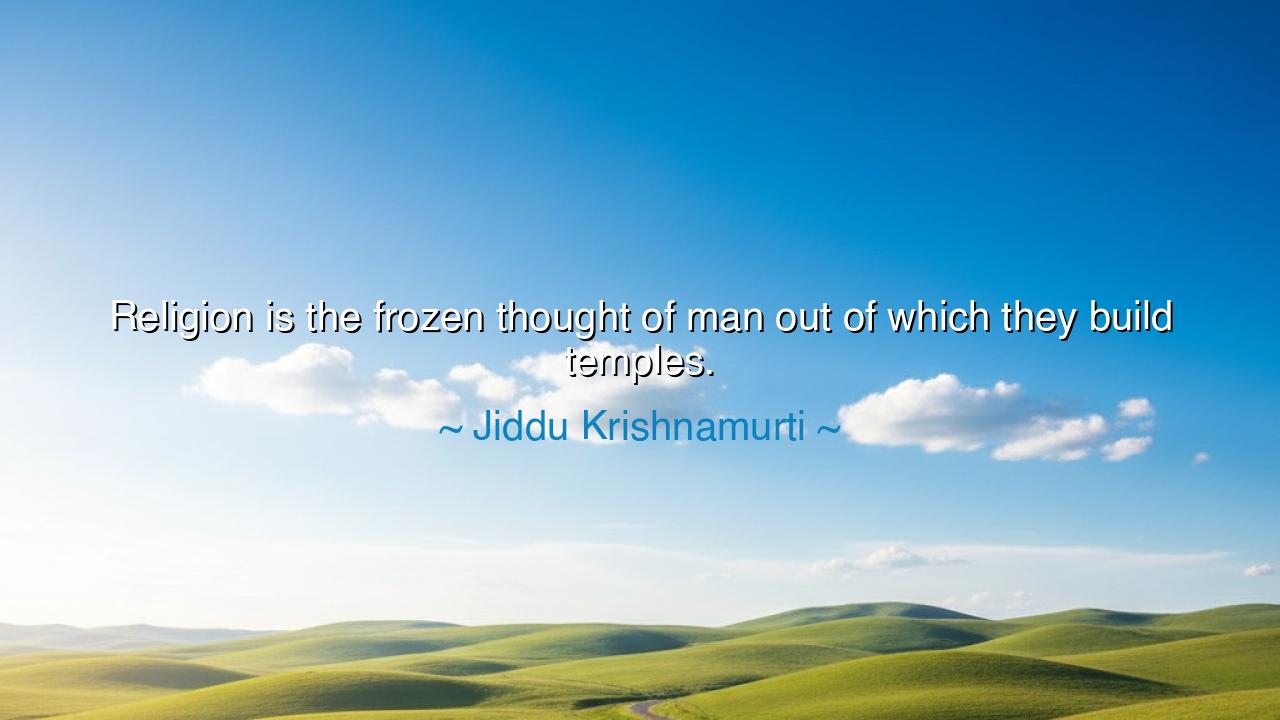
Religion is the frozen thought of man out of which they build






"Religion is the frozen thought of man out of which they build temples." – Jiddu Krishnamurti.
In these profound words, Jiddu Krishnamurti reveals a powerful insight into the nature of religion—not as a living, breathing essence, but as a frozen construct. Religion, as it has evolved, is often seen not as a living thought or dynamic experience, but as something static—something shaped from the thoughts of ancient men, locked in time and ritual. These thoughts are then set in stone, built into structures, rituals, and doctrines that seek to preserve what was once a vibrant, personal experience. Krishnamurti invites us to see that these temples, whether of stone, scripture, or tradition, are simply the shells of human thought, hardened by time and removed from the original spirit of truth and wisdom.
The ancient philosophers, such as Socrates, understood the importance of questioning the established beliefs of their time. Socrates, with his method of relentless questioning, sought to strip away the layers of assumed truth and return to a deeper, more personal understanding of what it meant to live a virtuous life. But in Krishnamurti's view, religion has fallen prey to the same fate as all human constructs—it has become frozen, cemented in the form of institutions and doctrines, which often prevent the seeker from discovering the deeper, living truth. The temple is a reflection of this frozen thought, a monument not to truth, but to the minds that built it, seeking to impose a structure upon the vast, uncontainable essence of the divine.
Look to the great temples of the past—Greece, Egypt, and India—each constructed as a symbol of divine power, a physical manifestation of the connection between humanity and the divine. These magnificent structures were meant to house the presence of gods, to represent the intersection of the human and the sacred. But in the course of time, what these temples often came to symbolize was not the divine experience itself, but rather the societal power and control of those who built them. The pharaohs and emperors who commissioned such works sought to create a lasting monument to their divine authority, and in doing so, they often obscured the living truth that the temple was meant to reflect.
Consider the great churches of Europe, the cathedrals that rise toward the heavens in silent testimony to an age gone by. These structures, while beautiful and awe-inspiring, are also symbols of a frozen thought—an era in which religion was dictated by authority, where doctrine and dogma reigned supreme, and individual spiritual exploration was often stifled. Martin Luther's 95 Theses, which challenged the very foundations of the Catholic Church, were a call to return to the living essence of faith—a faith unbound by the weight of institutional power. Luther's revolution sought to awaken people to the reality that religion, at its core, was about personal connection with the divine, not the construction of massive, immovable structures that acted as intermediaries between man and God.
In India, the temples of the past have similarly been shaped by a historical evolution, becoming places of pilgrimage and ritual, but often at the cost of the deeper, personal spiritual awakening that Krishnamurti advocates. Hinduism, with its rich diversity of deities and practices, originally offered a path of direct experience with the divine, yet over time, its practices became intertwined with elaborate rituals and social hierarchies that overshadowed the essence of the individual’s direct connection to the divine. Like a river that once flowed freely, the waters of religion were dammed and frozen into an unyielding form.
Krishnamurti’s call, then, is for us to unfreeze the thoughts that have shaped our religious and spiritual practices. He urges us to let go of the rigidity and formality of the temples and doctrines that bind us. Religion should not be about the preservation of tradition or the worship of institutions; it should be a living, breathing experience, something that is personal, dynamic, and ever-evolving. Spiritual truth is not something that can be captured in stone or paper; it is something that must be discovered anew, each day, in our interactions with ourselves, each other, and the world around us.
The lesson here is that religion should never be a substitute for personal spiritual experience. While temples, churches, and mosques are all meaningful as places of community and worship, they should not be confused with the living truth they are meant to represent. True spirituality is not found in rituals and doctrines, but in the heart’s direct experience of the divine. Therefore, let us release the frozen thought that keeps us bound to the past and embrace a new living truth—one that is fluid, vibrant, and personal.
In our daily lives, let us practice a spirituality that is free from the weight of tradition and dogma. Let us search for the living truth in our hearts, in the world around us, and in our relationships with others. May we come to understand that the temple is not a building of stone but a place within us, where the divine resides, constantly evolving and expanding. Through this understanding, we can transcend the limitations of the frozen thought that has held us captive and walk toward a more authentic, living spirituality.






AAdministratorAdministrator
Welcome, honored guests. Please leave a comment, we will respond soon